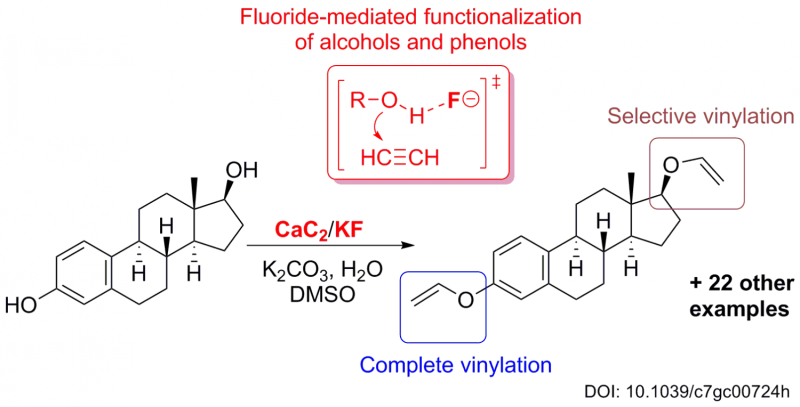Solid acetylene reagent for laboratory applications

Acetylene is one of the primary starting materials for chemical synthesis. However, acetylene is a highly flammable gas, dangerous and difficult to use in regular research laboratories. A novel solid acetylene regent has been developed to make chemical applications safer.
A combination of two simple compounds – calcium carbide (CaC2) and potassium fluoride (KF) – creates a very efficient acetylene reagent with enhanced reactivity. In the presence of water, acetylene is generated in this system, and is activated towards an in situ reaction with alcohols and phenols. Efficient vinylation converts the hydroxyl group (–OH) of alcohols and phenols into the H2C=CH-O- building block. The hydroxyl group is a widespread functional group involved in a number of core organic transformations. Post-modification of drugs and biologically active molecules is an emerging area of very demanding applications of the vinylation reaction described. Biomedicine, material science and production of monomers are other well-appreciated areas of application of such vinyl monomers.
Mechanistic studies by experiment and computations have revealed two important factors: (1) the etching of the surface of CaC2 by KF in the solid state; and (2) the fluoride-mediated activation in solution, which governs the enhanced reactivity in the developed system. The CaC2/KF system described in the present study has crucial advantages compared to gaseous acetylene.
Acetylene is a fundamental organic molecule. However, acetylene is a flammable and explosive gas, which is very difficult to handle in laboratory. Using high-pressure acetylene requires complicated and expensive equipment with stringent safety regulations. The CaC2/KF system described in the present study has crucial advantages compared to gaseous acetylene. This efficient CaC2/KF solid acetylene reagent, a has a number of remarkable applications.
More information: Werner G., Rodygin K.S., Kostin A.A., Gordeev E.G., Kashin A.S., Ananikov V.P, "A solid acetylene reagent with enhanced reactivity: fluoride-mediated functionalization of alcohols and phenols", Green Chem., 2017. DOI: 10.1039/c7gc00724h
Provided by Zelinsky Institute of Organic Chemistry


















